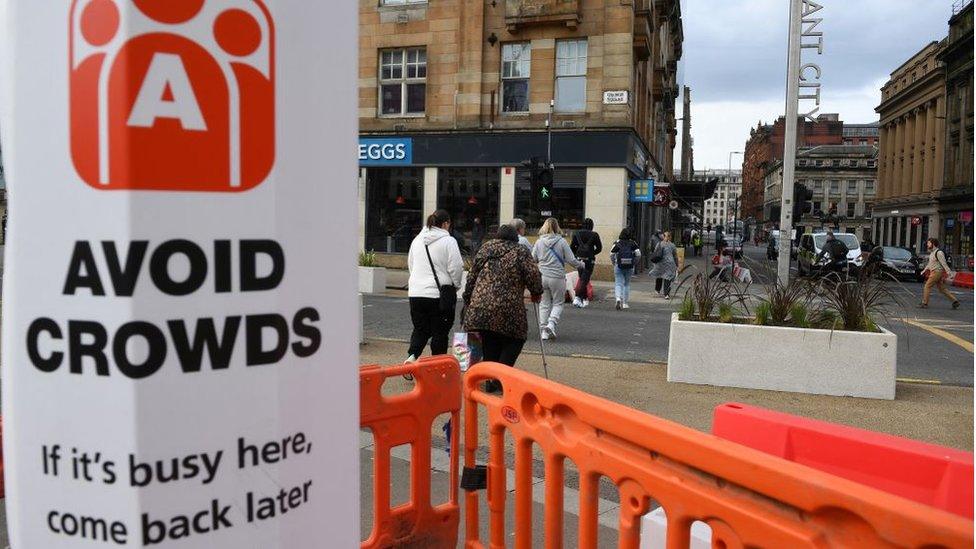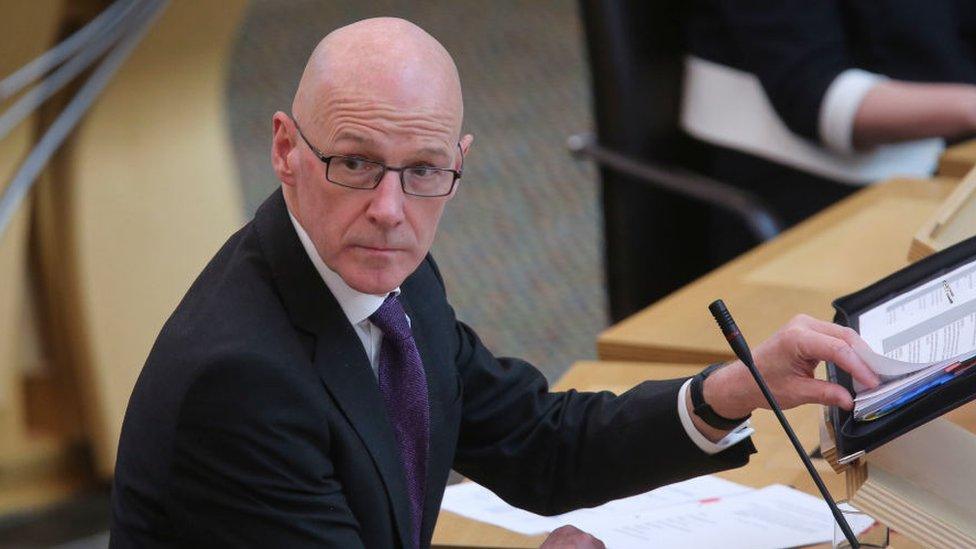MSPs back making emergency Covid powers permanent
- Published

Ministers say they want to be able to react quickly to any future public health emergencies
MSPs have voted to make some emergency Covid-19 powers permanent, including the ability to impose lockdowns and close schools.
Most pandemic powers were due to expire in March, two years after Scotland's first virus case was confirmed.
As well as measures affecting the education and justice systems the new legislation also makes it harder for tenants to be evicted.
But opposition politicians said the bill amounted to a "power grab".
MSPs took five hours to debate more than 90 amendments to the Coronavirus (Recovery and Reform) Bill before passing it by 66 votes to 52.
The bill proposes changes in 35 specific legislative areas, many of which originated in temporary Scottish and UK Covid legislation.
The reforms include permanent public health protection powers, similar to those which already exist in England and Wales.
Ministers will also have powers in relation to educational establishments so they can take action to protect public health and ensure the continuity of educational provision
There will also be increased protection for private rented tenants facing evictions, despite a warning from landlords that the new laws could cut the number of rental homes.
And it will grant a temporary extension of some changes in the justice system to help manage the backlog of court cases arising from the pandemic.

Deputy First Minister John Swinney said so-called "Henry VIII" powers in the legislation that allow ministers to make changes will be subject to parliamentary approval
Other measures include giving licensing boards and licensing authorities the flexibility to hold hearings remotely and allowing local authorities to issue directions so that birth and death registrations can be done remotely.
Deputy First Minister John Swinney said: "While the vast majority of temporary pandemic measures have already been removed or will expire by the end of September, the passing of this bill maintains those that will ensure we are better prepared for future public health threats, pragmatic reforms that have enabled more efficient or convenient public services, and some temporary changes to mitigate the impact Covid has had on our justice system.
"I am grateful to members and everyone who has participated in the bill process for their feedback, which helped to shape significant amendments that strengthen parliamentary safeguards when it comes to the use of public health protection and educational continuity powers, and support for those experiencing financial difficulties."
Many of the proposals are aimed at future Covid-19 outbreaks - or the spread of any other infectious virus which poses a serious risk to public health.
'Appropriate' scrutiny
Mr Swinney, who is also the Covid Recovery Secretary, told the chamber that in response to concerns expressed over the move, an explanation will be required as to why regulations would need to be introduced urgently, and an expiry date set for instances where there is no time limit.
So-called "Henry VIII" powers in the legislation that allow ministers to make changes will be subject to parliamentary approval, he added.
He said: "In all of these changes, the government has been listening to the concerns expressed by the external stakeholders and by members of parliament to ensure that we satisfy the objective of ensuring our statute book is updated to have the necessary powers to deal with the pandemic."
Use of such powers will be undertaken with an "appropriate" level of scrutiny from MSPs, Mr Swinney said.
'Shameless'
The Scottish Greens Greens claimed the bill would strengthen the rights of tenants and make it harder for landlords to evict tenants.
The party's housing spokeswomen Ariane Burgess said: "Access to good quality housing is a fundamental right and one that underpins the health, wellbeing, happiness and life-chances of people everywhere. This bill will be a big step forward for tenants, and will provide vital protections from eviction."
Murdo Fraser, of the Scottish Conservatives, said there were aspects of the Bill that his party would have been "happy to support had they been brought forward in another form".
"But too much in this bill to us was simply not necessary at this stage, and it does represent a power-grab on the part of Scottish ministers," he said.
Mr Fraser added a survey for the Covid Recovery Committee had nearly 4,000 responses, with as many as 90% of people who responded expressing concern about the proposals
'Frankenstein-like bill'
Labour's Jackie Baillie complained that the legislation - which she branded a "Frankenstein-like bill" - will see powers "handed over to government ministers".
The Scottish Labour deputy leader added that concessions by the government to address concerns "simply don't go far enough".
Ms Baillie said: "The executive will still have far-reaching powers which will potentially lead to ministers making rushed, ad hoc decisions, without the benefit of the appropriate level of scrutiny.
"This bill will not in and of itself lead to a better response to a future pandemic, and would diminish scrutiny and accountability.
"Let's be clear as to what ministers are attempting to do today, they are wrapping up a plethora of issues into one Frankenstein-like bill which is wholly unjustifiable."
The Liberal Democrats also criticised the government's approach, with Beatrice Wishart describing it as a "unprecedented and unsavoury power-grab by the Scottish government".
She said: "With this legislation the government is seeking to retain powers that they solemnly promised they would return as soon as possible."